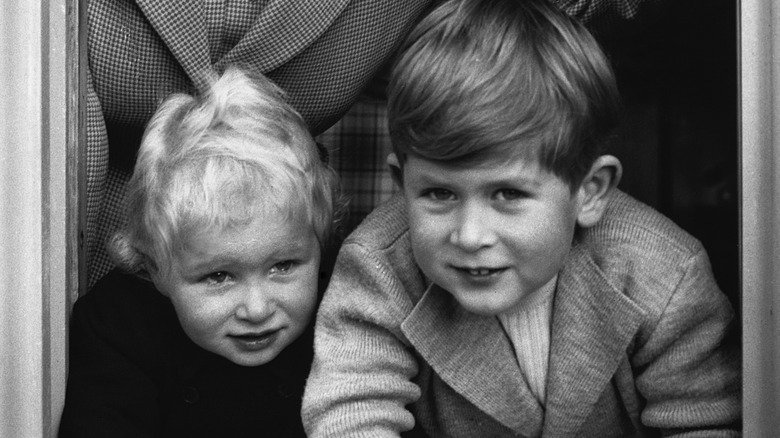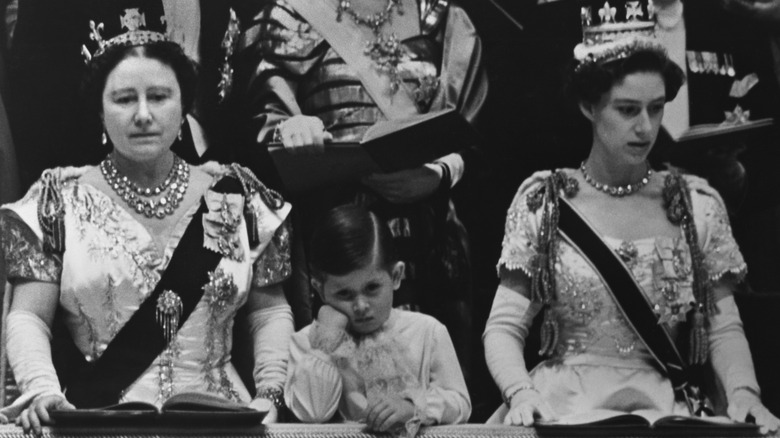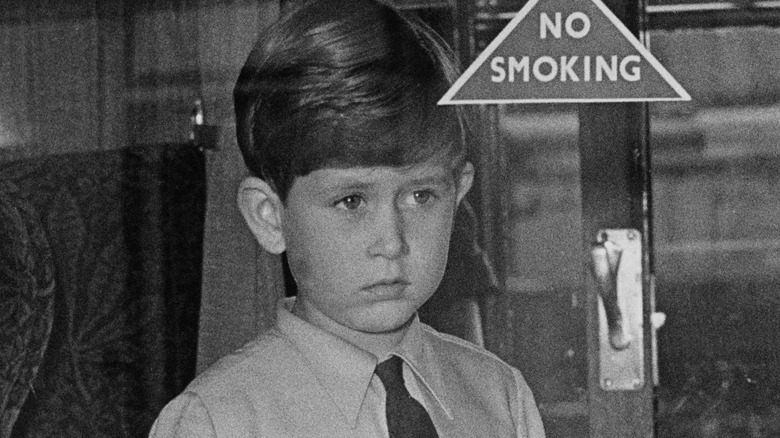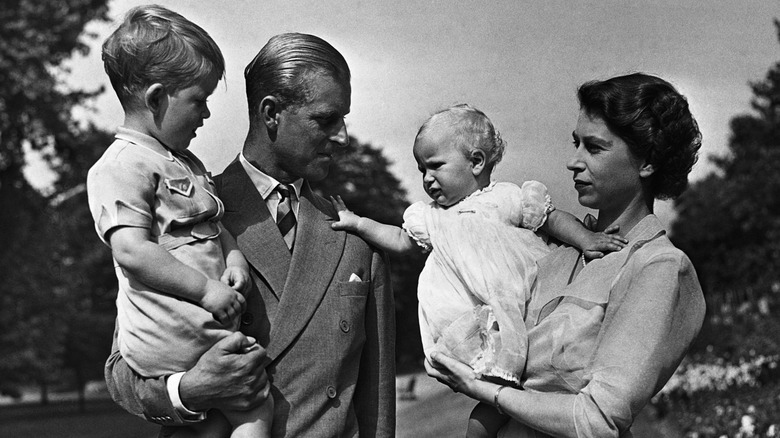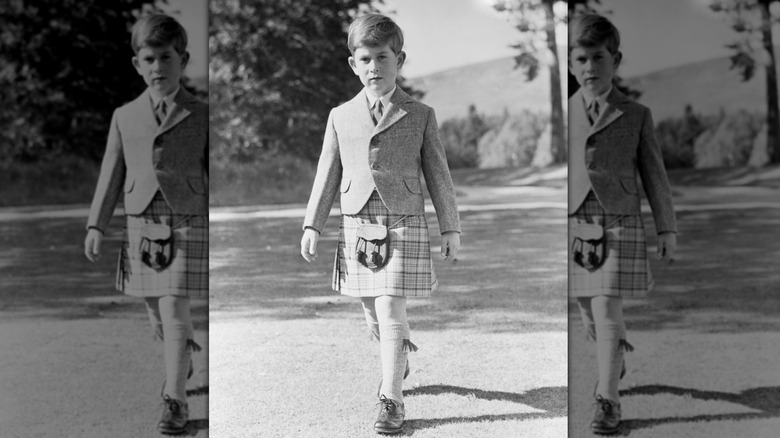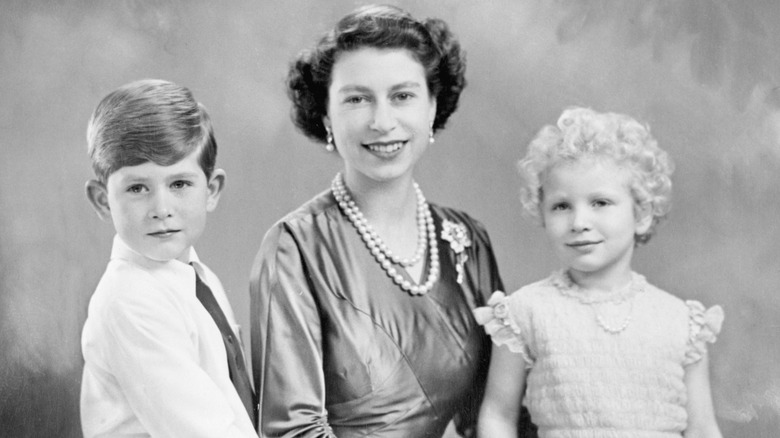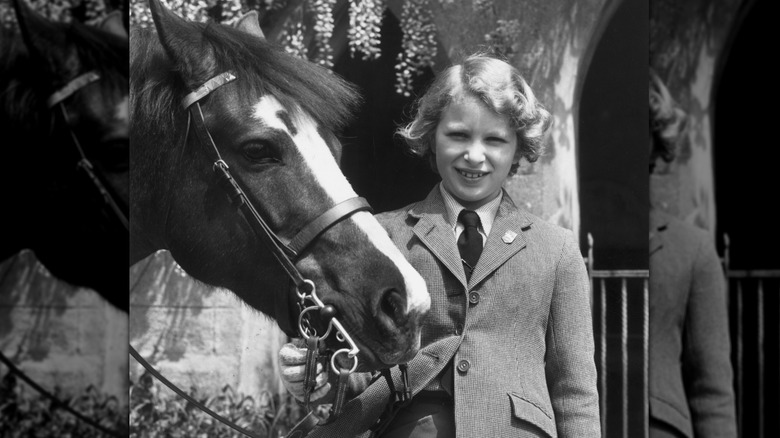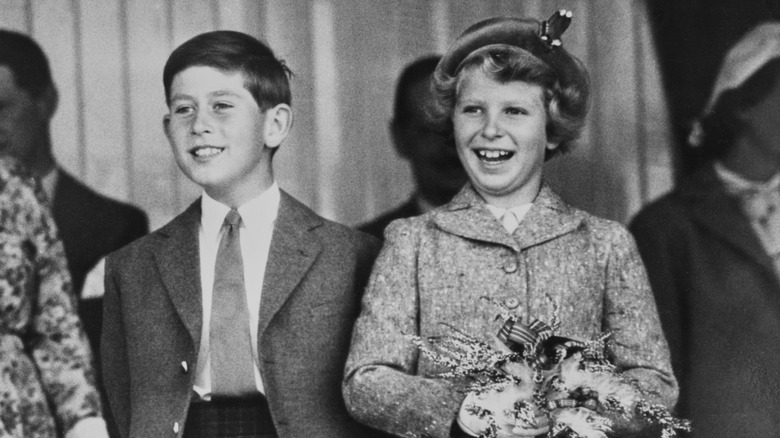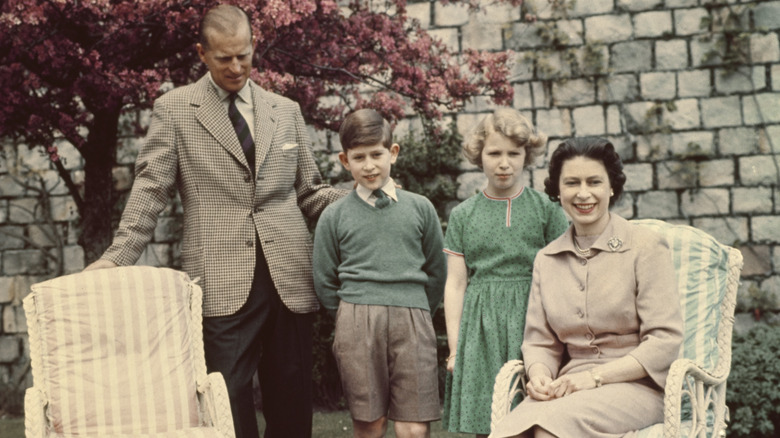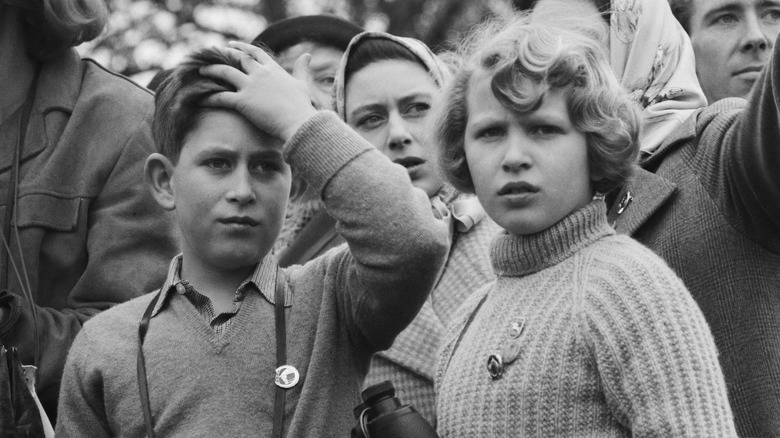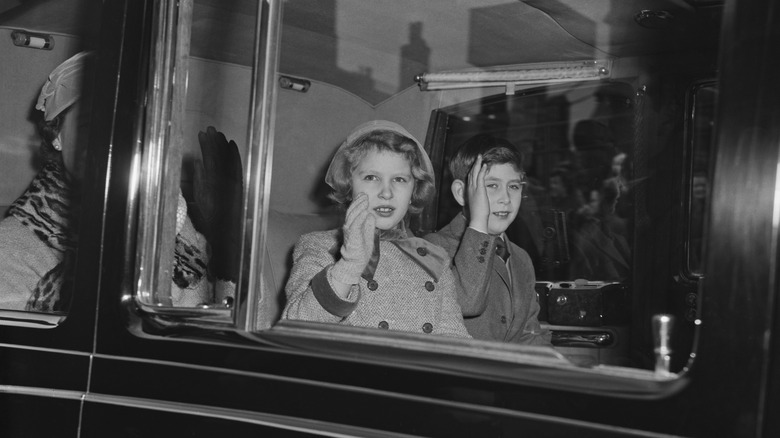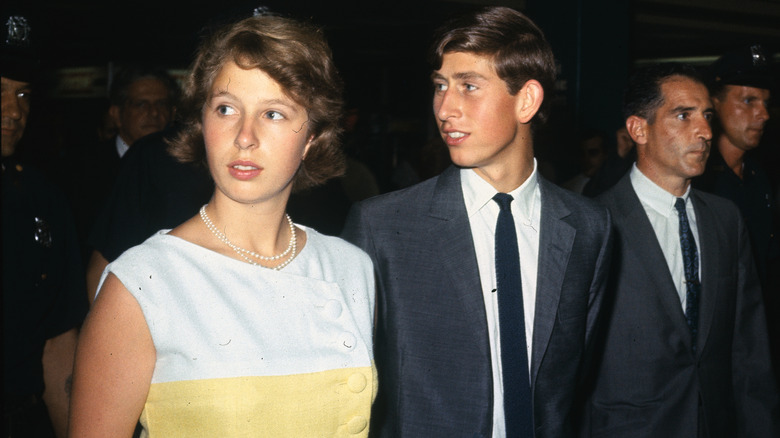How Princess Anne's Childhood Was Different From King Charles'
When it comes to incredibly privileged lifestyles, nobody has it better than the children of the royal family — just ask King Charles III and Princess Anne, who grew up in the opulent world of Britain's elite. Despite their regal status, their mother, Queen Elizabeth II, was determined to portray the family in an approachable light. Rather than shielding her children from the media, Elizabeth threw open the doors of Buckingham Palace and invited them in. In 1969, the BBC aired a documentary called "Royal Family," which offered a rare glimpse into the private lives of the queen and her brood. The show featured images of cozy family dinners, holiday celebrations, and a closer look at their roles as public figures.
As Elizabeth's eldest children, Charles and Anne were engrained in the public eye. They were born less than two years apart and have always maintained a close relationship. As youngsters, the pair bonded over common interests like travel and gardening. "My sister and I had a little vegetable patch in the back of a border somewhere," Charles recalled to BBC Radio. "We had great fun trying to grow tomatoes rather unsuccessfully and things like that."
But despite their many similarities, there's always been one glaring difference between the royal siblings: Charles was born heir to the throne, whereas Anne stood virtually no chance of inheriting the crown. Thanks to this unique set of circumstances, Charles and Anne had vastly different childhood experiences.
Charles attended Queen Elizabeth II's coronation, while Anne did not
In February 1952, the monarchy received a major shake-up when Queen Elizabeth II's father King George VI, died unexpectedly. The tragedy prompted a new chapter of the monarchy: Elizabeth — who was 25 at the time — inherited the crown and became England's sovereign. Of course, no ascension is complete without a glitzy coronation ceremony. On June 2, 1953, guests packed the halls of Westminster Abbey to witness Queen Elizabeth's historic crowning. One of the attendees was her young son and new heir apparent, then-Prince Charles. However, notably absent was the queen's daughter, Princess Anne.
At just 2 years old, Anne was deemed too young to attend the coronation ceremony. However, judging by Charles' facial expression during the event, he might have preferred to trade places with his little sister. During the coronation, Charles appeared visibly bored. In his defense, it didn't appear to be a very kid-friendly affair.
Despite Anne's absence from the ceremony, the young princess did make an appearance later in the day. The curly-haired tot was front-and-center during the balcony reception following Elizabeth's coronation ceremony.
King Charles' childhood was 'lonely' compared to Princess Anne's
When Queen Elizabeth II ascended the throne, it marked a new era in British history. During her 70-year reign, the iconic queen bolstered the monarchy with her charm, stoicism, and unwavering devotion to the crown. Upon her death in 2022, Elizabeth was one of the world's most prominent figures. But like all the greats, her story involved sacrifices. Serving the crown required Elizabeth to forfeit time with her children, King Charles III and Princess Anne.
Due to her frequent travels and diplomatic engagements, Charles and Anne missed out on copious time with their mother. The queen counted on her husband, Prince Philip, to take on the majority of child-rearing duties. But even with their father around, Charles and Anne spent most of their days being cared for by nannies. Time described Charles' childhood as a "lonely" time, noting that he struggled to cope with Elizabeth's absence. The royal told biographer Jonathan Dimbleby that his mother was "not indifferent so much as detached" (via Vanity Fair).
On the other hand, Anne's relationship with the queen was anything but distant. The pair had a deep understanding of each other, with Anne even mirroring her mother's mannerisms and stoic demeanor. They also bonded over their enjoyment of horses and equestrian sports. In 2002, Anne publicly defended Elizabeth's parenting style. "I simply don't believe that there is any evidence whatsoever to suggest that she wasn't caring," Anne told the BBC. "It just beggars belief."
Only one of them had a strained relationship with Prince Philip
With Queen Elizabeth II frequently out of the picture, King Charles III and Princess Anne relied on their other parental figure: their father, Prince Philip. Both children had a relationship with their dad, but it wasn't always a tender one. Philip was a hands-on father who enjoyed family activities like sailing and camping. However, he reportedly struggled to form an emotional bond with his children. Philip was said to have been stern and insensitive toward the young royals.
Despite his hard exterior, Philip bonded with Anne over horses. Both were accomplished equestrians, and Philip enthusiastically supported Anne's riding career. Some royal experts speculate that Anne was Philip's favorite child. In the documentary "Prince Charles at 50: Heir to Sadness," Charles' biographer Anthony Holden stated, "It's often been said and it's probably true that Princess Anne was his 'favourite son,' his only daughter, because she, in Philip's eyes, showed a lot more strength of character than any of his sons."
On the other hand, Charles had a stormy relationship with his father. According to Philip's cousin, Countess Mountbatten, the royal expected Charles to be stereotypically masculine and was bothered by the boy's timid nature. "A resilient character such as Philip ... who sees being tough as a necessity for survival, wants to toughen up his son," the countess recalled (via the Daily Mail). "And his son is very sensitive. It hasn't been easy for either of them."
Charles had more responsibilities than Anne
When the first images of King Charles III circulated shortly after his birth in 1948, the public knew they were looking at England's future ruler. As heir apparent to his mother, Queen Elizabeth II, Charles' destiny was already set in stone — even as he lay in his bassinet. In general, royal children always have to follow strict rules, but future sovereigns are held to the highest standard of all. As a child, Charles was expected to embody a polite, stoic persona. Meanwhile, Anne got away with being less polished. "[Anne] has been cited as being thoughtless compared to her brother," royal biographer Nicholas Courtney noted (via Express). "For example, it was the well-mannered Charles who took her by the hand to thank the engine-driver who drove them to Sandringham."
Some experts suggest that Charles felt weighed down by the knowledge of his impending kinghood. In the absence of such pressure, Anne was the antithesis of Charles; she emerged as the carefree wild-child of the royal brood. According to family friend Eileen Parker, Anne ran circles around her older brother. "Anne would boss Charles; she would take command of things," recalled Parker (via the Daily Mail). "When [Anne] got really worked up, she would start throwing things at him. She was very strong-willed, a real menace."
A patriarchal rule dictated Anne's place in the succession line
It's no secret that some royal traditions are steeped in archaic, gender-normative ideals. As the only daughter of Queen Elizabeth II, Princess Anne has certainly felt the brunt of institutionalized sexism within the monarchy. Case in point: Anne is lower in the line of succession than you might think. At birth, Anne was third in the lineup. However, due to a now-defunct rule that prioritized male heirs, she didn't stay in third place for long. When Anne's younger brothers were born, they surpassed her in the line of succession. Subsequently, the princess was bumped even further down the line by her brothers' children and grandchildren. On the flip side, Charles' place in the succession line has always been firm.
In 2024, the Princess Royal is 17th in line for the throne. In 2013, Britain enacted the Succession of the Crown Act, which ensured that men would no longer outrank women in the succession line. However, the Act doesn't apply retroactively, meaning that Anne will never become queen. Some royal watchers believe that Anne's distance from the crown is a major loss for England. "There are plenty in palace circles who believe she is the best king we will never have," wrote royal biographer Tina Brown in "Palace Papers."
Princess Anne was able to pursue her passions, whereas King Charles had to focus on the crown
With the crown so far out of reach, Princess Anne was able to choose her own life's path. After discovering her passion for horseback riding, the young royal decided to run with it. Anne entered her first riding competition at age 11. In the following years, she became an equestrian superstar. The royal went on to win numerous awards, including a gold medal at the European Eventing Championships. In 1976, Anne competed in the Olympic Games, making her the first royal to ever do so.
For Charles, however, following his passion was never an option. From an early age, he knew his future was inextricably tied to the monarchy. In 1969, the then-prince opened up to Time about what it felt like to have his fate preordained. "I think it's something that dawns on you with the most ghastly, inexorable sense," Charles confessed.
The king may have accepted his dynastic destiny, but that didn't stop him from daydreaming about the life he'll never have. "First I thought of being the proverbial engine driver or something. Then I wanted to grow up to be a sailor," the monarch told Time. "When I started shooting, I thought how marvelous it would be to be a big-game hunter. I went from one thing to the other until I realized I was rather stuck."
Charles got the majority of bad press
Long before he was the sovereign of England, King Charles III inadvertently became the king of bad press. Charles' most memorable scandals have generated endless tabloid fodder — but his fraught relationship with the media started earlier than expected. At age 14, the future sovereign caused an uproar when he was spotted drinking an adult beverage at a bar. Charles' boozy adventure was captured by a journalist and published in tabloids across the world. For the average person, a little underage drinking probably wouldn't be scandalous enough to sink your entire reputation, but in Charles' case, the situation caused serious backlash. In fact, things got so heated that Charles' body guard was blamed and subsequently fired for the mishap.
Like her brother, Princess Anne has a volatile history with the media. One of her most iconic scuffles occurred in 1982 when she famously told the paparazzi to "naff off." Amongst other things, Anne has been called "sulky," "bad-tempered," and "impolite" by the press. At one point, she was even dubbed "Her Royal Rudeness." But despite her reputation, the media has arguably been more lenient toward Anne, especially during her youth. Princess Anne has been declared a total boss more times than anyone can count and is widely admired for her brash attitude. Meanwhile, Charles has been weathering bad press since childhood.
Grade school was a blast for Anne and a bummer for Charles
When it comes to education, royals receive the best of the best. In King Charles and Princess Anne's case, both royals attended elite boarding schools; however, that's basically where the similarities end.
Anne was a student at Benenden School, a prominent all-girls institution in England. By all accounts, the royal thrived at school and was treated like a typical teenager — plus, she was a social butterfly. In the documentary "Anne: The Princess Royal at 70," her former classmate recalled, "There was a really lovely security officer and we did lead him [on] a bit of a dance. It was rather fun to break out of school and go to the fish and chip shop and try to escape this loyal detective who was supposed to be looking after her."
As for Charles, he attended Gordonstoun, a boarding school in northern Scotland. Unlike Anne, he struggled to fit in and was bullied mercilessly by his peers. In 1964, the prince wrote a letter describing the torment from his "horrid" classmates. "They throw slippers all night long or hit me with pillows or rush across the room and hit me as hard as they can, then beetle back again as fast as they can, waking up everyone else in the dormitory at the same time," he lamented. "I still wish I could come home. It's such a hole this place!" (via The Guardian).
Anne didn't attend the same school as Charles
King Charles' experience at Gordonstoun may have been the scourge of his youth, but it was also quite unconventional. Before Charles' time, successors to the crown were strictly homeschooled. Thus, his exodus to boarding school represented a major shift in royal protocol. The royal family already had a history with Gordonstoun: Charles' father, Prince Philip, had attended the academy as a boy. At the time, the school was known for being harsh and authoritarian. Their educational strategy involved teaching students responsibility and self-discipline by exposing them to physical discomfort. A typical day at the school involved early morning runs and mandatory cold showers. Students were forced to wear shorts year-round — even in biting cold temperatures.
With those details in mind, some might argue that Princess Anne dodged a bullet by not attending Gordonstoun. In any case, there's a simple reason why the princess was never enrolled in the school — at the time, it was an all-boys institution. Nowadays, Gordonstoun has changed their policy and girls are welcome on campus. In fact, Anne even sent her own children, Zara Tindall and Peter Phillips, to the boarding school. Contrary to their uncle, both Zara and Peter have said that they enjoyed their time at Gordonstoun.
The royal siblings had vastly different interests
King Charles III and Princess Anne may be cut from the same regal cloth, but as children, their interests couldn't have been more different. For starters, Anne was a dynamo at sports. In the documentary "Anne: The Princess Royal at 70," a former playmate described her as "determined" and "more competitive than most." Her favorite activities were sailing and of course, horseback riding. Some might say she was born to be a champion, but Anne herself says she's merely a product of her environment.
"For many children, the sport they do is because that is the one that was most available to them," the princess once said (via The Standard). "I was lucky there were horses involved and I was lucky that I was good enough and interested enough to go on with it. I don't ever remember not riding."
As a child, Charles was encouraged to be athletic, but it wasn't his passion. Royal biographer Sally Bedell Smith noted that the monarch tried several sports — including rugby, cricket, and soccer — but gave up after realizing he wasn't any good at them. Instead, Charles gravitated to the arts. The royal enjoyed drawing, painting, pottery, and music. He also had a flare for drama. During the 1960s, the young prince starred in several Shakespearean plays, including his school's production of "Macbeth."
Only one of the siblings had college aspirations
In 1967, King Charles III signed on to attend Trinity College, Cambridge, where he studied anthropology, archaeology, and history. Charles graduated with a Bachelor of the Arts, thus becoming the first college-educated member of the royal family.
Princess Anne, on the other hand, didn't have the same academic gusto as her older brother. After getting through secondary school with average grades, the Princess Royal decided to close the book on her scholastic career. In the documentary "Anne: The Princess Royal at 70," Anne got candid about why she opted out of going to college. "So many of my contemporaries, when asked why they were going to university, would say, 'Well basically because that's what you do,'" she explained. "And I remember thinking really that doesn't sound like a very good reason to go university, so I thought I would skip that."
Rather than reading about culture and global politics in the classroom, Anne decided to experience them first-hand by accompanying her mother on official tours. Thus, at age 18, Anne officially became a working royal. Fast-forward to the present day, and Princess Anne has transformed into one of the most active and hardworking members of the royal family.
